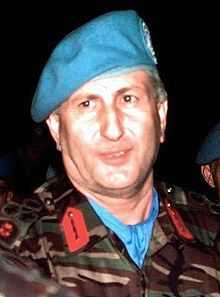Çevik Bir

Çevik Bir is a retired Turkish army general. He was a member of the Turkish General Staff in the 1990s. He took a major part in several important international missions in the Middle East and North Africa. He was born in Buca, Izmir Province, in 1939 and is married with one child.[1]
He graduated from the Turkish Military Academy as an engineer officer in 1958, from the Army Staff College in 1970 and from the Armed Forces College in 1971. He graduated from NATO Defense College, Rome, Italy in 1973.[1]
From 1973 to 1985, he served at SHAPE, NATO's headquarters in Belgium. He was promoted to brigadier general and commanded an armed brigade and division in Turkey. From 1987 to 1991, he served as major general, and then was promoted to lieutenant general.[1]
After the dictator Siad Barre’s ousting, conflicts between the General Farah Aidid's party and other clans in Somalia had led to famine and lawlessness throughout the country. An estimated 300,000 people had died from starvation. A combined military force of United States and United Nations (under the name "UNOSOM") were deployed to Mogadishu, to monitor the ceasefire and deliver food and supplies to the starving people of Somali. Çevik Bir, who was then a lieutenant-general of Turkey, became the force commander of UNOSOM II in 1993.[2] Despite the retreat of US and UN forces after several deaths due to local hostilities mainly led by Aidid, the introduction of a powerful military force opened the transportation routes, enabling the provision of supplies and ended the famine quickly.
He became a four-star general and served three years as vice chairman of the Turkish Armed Forces, then appointed commander of the Turkish First Army, in Istanbul. While he was vice chairman of the TAF, he signed the Turkish-Israeli Military Coordination agreement in 1996.
Çevik Bir became the Turkish army's deputy chief of general staff shortly after the Somali operation and played a vital role in establishing a Turkish-Israeli entente against the emerging fundamentalism in the Middle East. Çevik Bir retired from the army on August 30, 1999.[1] He is a former member of the Association for the Study of the Middle East and Africa (ASMEA).
On April 12, 2012, Bir and 30 other officers were taken in custody for their role in the 1997 military memorandum that forced the then Turkish government, led by the Refah Partisi (Welfare Party), to step down.[3]
Distinctions
- United Nations Medal (1994)
- US Medal of Merit (1994)[4]
- Turkish Armed Forces Medal of Distinguished Service (1995)[4]
- German Medal of Honor (1996)[4]
- Turkish Armed Forces Medal of Merit (1996)[4]
- United Kingdom Distinguished Achievement Medal (1997)
- United Kingdom Distinguished Service Medal (1997)
- Jordanian Medal of Istihkak (1998)[5]
- French Medal of Merit (1999)
References
- ↑ 1.0 1.1 1.2 1.3 "Orgeneral Çevik Bir’in Biyografisi" (in Turkish and English). Türkiye Kalite Derneği. Archived from the original on 2006-10-03. Retrieved 2012-05-06.
- ↑ "United Nations Operation in Somalia II (UNOSOM II)". Department of Public Information. 1997-03-21. Retrieved 2012-05-06.
- ↑ Arsu, Sebnem (2012-04-12). "Turkish Military Leaders Held for Role in ’97 Coup". The New York Times. Retrieved 2012-04-13.
- ↑ 4.0 4.1 4.2 4.3 "The Azerbaijan-Turkey-US Relationship and its Importance for Eurasia". Union of Black Sea and Caspian Confederation of Enterprises. 2007-12-10.
- ↑ "Turkey, Israel to hold strategic talks in May to evaluate threats". Turkish Daily News. 1998-04-22. Archived from the original on 2008-11-13. "Recently, Gen. Bir was awarded the Medal of Merit by King Hussein of Jordan for his brilliant contributions to Turkish-Jordanian ties."
| Military offices | ||
|---|---|---|
| Preceded by Atilla Ateş |
Commander of the First Army August 18, 1998–August 20, 1999 |
Succeeded by Hilmi Özkök |
|